

VoteWatch Europe: European Parliament, Council of the EU. Europäischer Stabilitätspakt (ESM) ist Machtergreifung der EU-Diktatoren.f4v. Europe’s Economic Suicide. Just a few months ago I was feeling some hope about Europe.

You may recall that late last fall Europe appeared to be on the verge of financial meltdown; but the European Central Bank, Europe’s counterpart to the Fed, came to the Continent’s rescue. It offered Europe’s banks open-ended credit lines as long as they put up the bonds of European governments as collateral; this directly supported the banks and indirectly supported the governments, and put an end to the panic. The question then was whether this brave and effective action would be the start of a broader rethink, whether European leaders would use the breathing space the bank had created to reconsider the policies that brought matters to a head in the first place.
But they didn’t. Instead, they doubled down on their failed policies and ideas. "In Europe We Distrust" by Ana Palacio. Exit from comment view mode.
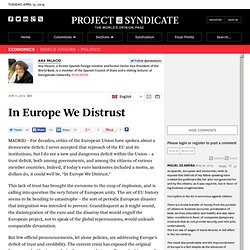
Click to hide this space MADRID – For decades, critics of the European Union have spoken about a democratic deficit. Viewpoint: Greece should default and abandon the euro. 26 October 2011Last updated at 00:06 Jeffrey Miron argues that a default imposes the losses on those who profited in the good times Jeffrey Miron, senior lecturer in economics at Harvard University, believes that the consequences of a Greek default are overstated.
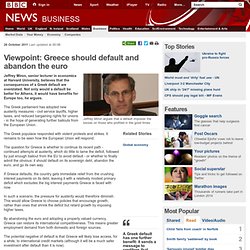
Not only would a default be better for Athens, it would have benefits for Europe too, he argues. The Greek parliament has adopted new austerity measures - civil service layoffs, higher taxes, and reduced bargaining rights for unions - in the hope of generating further bailouts from the European Union. The Greek populace responded with violent protests and strikes. Greek referendum is coin-flip on euro exit. 1 November 2011Last updated at 12:48 The Greek referendum call is, while it lasts, effectively a plebiscite on euro membership.
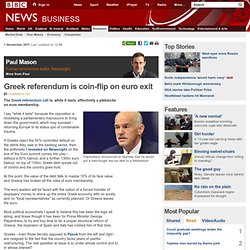
Papandreou announced on Monday that he would put a hard-fought rescue deal to a referendum. The Origins of the Greek Financial Crisis. Before the modern Greek state assumed its present day contours in the aftermath of the first world war, communities in the trading cities of Alexandria, Odessa, Salonika, Smyrna, and Trieste, already had a long history of running their own school systems, hospitals, and orphanages.
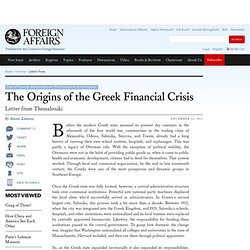
This was partly a legacy of Ottoman rule. With the exception of political stability, the Ottomans were not in the habit of providing public goods so, when it came to public health and economic development, citizens had to fend for themselves. That system worked. Il Pleut. Greece has poured vinegar on the G20's frites. 3 November 2011Last updated at 15:13 Mark the date: 3 November 2011.

In Oakland, California, protesters - including workers - have blocked the operation of a major US port; in New York, one of the world's top stockbrokers is bust; in Europe the Greek government is on the brink of collapse, the Italian government in disarray and speculators are short-selling French sovereign debt in the expectation of a domino effect. In Cannes, amid torrential rain, many of the leaders have adopted the Gallic shrug: what can you do? Greece's Default Dilemma. In the January 18, 2002, issue of the Spanish newspaper El Pais, Anne Krueger, then the first deputy managing director at the IMF, pointed out that more than ninety sovereign defaults had occurred over the last two centuries.
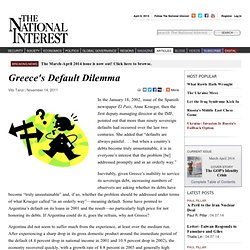
She added that “defaults are always painful . . . but when a country’s debts become truly unsustainable, it is in everyone’s interest that the problem [be] addressed promptly and in an orderly way.” Inevitably, given Greece’s inability to service its sovereign debt, increasing numbers of observers are asking whether its debts have become “truly unsustainable” and, if so, whether the problem should be addressed under terms of what Krueger called “in an orderly way”—meaning default.
Some have pointed to Argentina’s default on its loans in 2001 and the result—no particularly high price for not honoring its debts. The Greek Haircut and Europe's Shared Responsibility. Since the outbreak of the financial crisis in 2008, the German government has been fixated on the dangers of moral hazard: Berlin has resisted calls to foot the bill for the reckless spending of its profligate counterparts in Athens, Rome, and elsewhere.
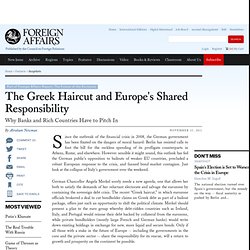
However sensible it might sound, this outlook has fed the German public’s opposition to bailouts of weaker EU countries, precluded a robust European response to the crisis, and fanned bond market contagion. Just look at the collapse of Italy’s government over the weekend. German Chancellor Angela Merkel sorely needs a new agenda, one that allows her both to satisfy the demands of her reluctant electorate and salvage the eurozone by containing the sovereign debt crisis.
The recent “Greek haircut,” in which eurozone officials brokered a deal to cut bondholder claims on Greek debt as part of a bailout package, offers just such an opportunity to shift the political climate. To continue reading, please log in. Don't have an account? Register. The 70% Solution - J. Bradford DeLong. Exit from comment view mode.

Click to hide this space BERKELEY – Via a circuitous Internet chain – Paul Krugman of Princeton University quoting Mark Thoma of the University of Oregon reading the Journal of Economic Perspectives – I got a copy of an article written by Emmanuel Saez, whose office is 50 feet from mine, on the same corridor, and the Nobel laureate economist Peter Diamond. Saez and Diamond argue that the right marginal tax rate for North Atlantic societies to impose on their richest citizens is 70%. It is an arresting assertion, given the tax-cut mania that has prevailed in these societies for the past 30 years, but Diamond and Saez’s logic is clear. The superrich command and control so many resources that they are effectively satiated: increasing or decreasing how much wealth they have has no effect on their happiness. The utilitarian economic logic is clear. Greek Economists for Reform.com.
The article below, written by Yannis Ioannides and Chris Pissarides, is part of the ongoing discussion on this blog about the costs and benefits for Greece to continue being part of the Eurozone.
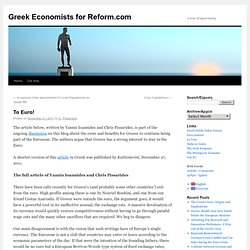
The authors argue that Greece has a strong interest to stay in the Euro. A shorter version of this article in Greek was published by Kathimerini, November 27, 2011. The full article of Yannis Ioannides and Chris Pissarides There have been calls recently for Greece’s (and probably some other countries’) exit from the euro. Spain's Election is Set to Worsen the Crisis in Europe.
For Europe, it turns out that November is the cruelest month: The debt crisis will claim at least three eurozone governments before it is over. Yet, unlike in Greece, where Prime Minister George Papandreou resigned last week, and in Italy, where Prime Minister Silvio Berlusconi stepped down over the weekend, the political crisis upending Spain is toppling the government in slow motion. Facing dwindling public support, an unemployment rate of more than 20 percent, and the increasing cost of Spanish debt, the country's Socialist Prime Minister José Luis Rodríguez Zapatero threw in the towel last July and called for early elections to be held on November 20, four months ahead of schedule. Why doesn't Britain make things any more? Before moving to Yale and becoming a bestselling historian, Paul Kennedy grew up on Tyneside in the 50s and 60s. "A world of great noise and much dirt," is how he remembers it, where the chief industry was building ships and his father and uncles were boilermakers in Wallsend.
Last year the academic gave a lecture that reminisced a little about those days. 29/11 2011 - A turning point in British history. 30 November 2011Last updated at 12:38 Yesterday will be seen as a landmark in British economic history, and in British politics. It will relegate George Osborne's emergency budget of June 2010 to a footnote and elevate Robert Chote's happy-go-lucky assessment of our economic prospects in November 2010 to the status of a case study in predictive failure. Because yesterday's Autumn Statement will set the political tone of the decade: it will tie the hands of future governments; and it has already brought a philosophical debate on the British right to an abrupt end.
Within six hours of their tight-lipped ordeal on the government benches, Lib Dem MPs heard Danny Alexander pledge them to go into the 2015 election fully committed to £30bn more austerity than they signed up for in the Coalition Agreement. "You've bagged a tiger there," a stunned editor of the FT told my stunned colleague Jeremy Paxman. London vs. the Eurozone - Howard Davies. Exit from comment view mode. Click to hide this space LONDON – Ever since the United Kingdom joined the European Economic Community in 1973, after the French withdrew Charles de Gaulle’s veto of its membership, Britain’s relationship with the European integration process has been strained. The Euro in a Shrinking Zone - Robert Skidelsky.
Exit from comment view mode. Click to hide this space LONDON – The recent European Union summit was a disaster. Both Britain and Germany played the wrong game: British Prime Minister David Cameron isolated Britain from Europe, while German Chancellor Angela Merkel isolated the eurozone from reality.
Had Cameron brought an economic-growth agenda to the summit, he would have been fighting for something real, and would not have lacked allies. As it was, he fully accepted Merkel’s austerity agenda – which his own government is implementing independently – and chose to veto proposals for a new European treaty to protect the City of London. The agreement reached in Brussels forecloses any possibility of Keynesian demand management to fight recession.
Rational Irrationality: The Message from Britain: A Failed Experiment in Austerity Policies. With the euro zone on the brink of breaking up, it is easy to overlook events across the English Channel, but what is happening to the U.K. arguably has more important lessons for the U.S. In continental Europe, we are witnessing the crisis of a poorly designed monetary system that is very different from our own. In the U.K., we are seeing the results of monumental policy blunders that could well be repeated here if Republican budget hawks seize power next November. During the past eighteen months, a callow and arrogant Chancellor of the Exchequer, empowered by a hands-off Prime Minister and backed by the bulk of the country’s financial and media establishment, has needlessly brought Britain to the brink of another recession by embracing draconian spending cuts that hark back to the early nineteen-thirties.
Rather than changing course and taking measures to boost growth, the Conservative-Liberal coalition is doubling down on austerity. And all this for what? Sensible? European Union website, the official EU website. Front Page. The End of Berlusconi and the Future of Italy. Technocrats: Minds like machines. Can Italy Be Saved? - Michael Spence. How Italy's Democracy Leads to Financial Crisis. Despite Its Troubles, the Euro Area Is Making Progress. Yes, the headlines from the euro area are discouraging. The region’s Purchasing of Managers Index (PMI) is falling again—to 45.9 in May, with even German levels down. The European stock markets are down. The euro has slid to 1.25 vs. the dollar, accelerating preparations for a Greek euro exit. No resolutions of the political crisis came from an acrimonious if informal EU Council meeting.
To paraphrase Charles Dickens’s famous comment about America’s propensity to declare doom, it seems as if the global media, financial markets, and pundits are to be believed, the euro area is always depressed, always stagnated, and always in an alarming crisis—and never was otherwise. Bernanke bails out Europe. Warning that America’s sputtering economic recovery was grinding down, this week the Federal Reserve noted in classic Fed-speak that “strains in global financial markets continue to pose significant downside risks to the economic outlook.” But the Fed and its soft-spoken chairman Ben Bernanke announced nothing new to fix those strains. And they said even less about the steps they were already taking to prop up the staggering banks in Europe.